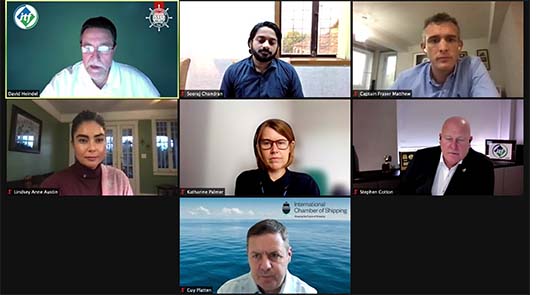Seafarers are on the frontline of climate change, hears ITF Sustainability Roundtable
29 October 2021

The International Transport Workers' Federation (ITF) has launched its Sustainable Shipping Policy in an online webinar featuring panellists from the industry and seafarers themselves, including Nautilus Council member Captain Fraser Matthew.
The event was moderated by David Heindel, chair of the ITF Seafarers Section and ITF Sustainable Shipping Working Group. Mr Heindel introduced the organisation's Sustainable Shipping position paper, highlighting that seafarers recognise the urgent challenge of climate change and that widespread systemic change is needed to speed up the maritime industry's transition to a zero carbon future.
'The reason we're here today is because we know we can do better collectively, seafarers as well as the industry that employs us want to be part of the solution,' Mr Heindel said.
He emphasised the passion that seafarers have for making the change because they are already seeing the impact of climate change. 'We are at the frontlines of climate change. It's often seafarers who are the ones pulling people from floodwaters. It is seafarers rescuing from our oceans the growing numbers of climate refugees who are fleeing climate change driven droughts, famines, fires, and rising sea levels.'
Mr Heindel then introduced the paper's eight fundamental principles:
- The transition must be ambitious: workers must have a planet that is safe to live on
- The transition must be timely: shipping must pull its weight and commit to zero emissions by 2050
- The transition must be democratic: maritime workers must have a say on the future
- The transition must improve seafarers' working lives: protecting jobs, working conditions and safety
- The transition must be safe: support a health and safety-first approach
- The transition must be equitable: training must be fully funded for all seafarers
- The transition must be diverse: promotion of women and young workers
- The transition must be funded: public regulation and funding must drive decarbonisation
The webinar then heard from industry experts Stephen Cotton, general secretary of the ITF; Guy Platten, secretary general of the International Chamber of Shipping (ICS); and Katherine Palmer, shipping lead at the UN High Level Climate Champions team for COP26.
Three seafarers from across the world then shared their views on why sustainable shipping is important to them and the risks and opportunities they see in the transition to a sustainable shipping future, including Nautilus Council member Captain Fraser Matthew.
Cpt Matthew raised concerns over the criminalisation of seafarers regarding the use of alternative fuels. 'Regarding this move now to lower sulphur fuel, unfortunately due to legislation it has become the responsibility of the master. He can take delivery of a low sulphur fuel and, if it unfortunately fails the tests, he is then liable. I don't understand how somebody could be liable for something that has been delivered, but there is a worry that the criminalisation of seafarers is only going to increase as we move to all kinds of fuels, more dangerous fuels. The working environment will also become more dangerous if it hasn't been risk assessed and support for training provided.'
Cpt Matthew further emphasised that a sustainable workforce for a sustainable future is not possible if the industry cannot attract or retain the next generation of seafarers. 'We need to reform crew welfare, crew accommodation, crew standards onboard ships,' he said.
American seafarer and member of Seafarers International Union of North America (SIU) Lindsey Austin has seen the environmental impact of climate change already and the importance of educating the next generation of seafarers. 'What I've noticed with seafarers, especially young seafarers, is that the more we educate them and train them, the more they feel empowered towards change,' she said.
In the Q+A session, Nautilus general secretary Mark Dickinson asked the panellists 'crew numbers on all types of vessels have been going down for decades now and seafarers have fleeing due to the impact of overwork. How can we ensure that the transition to zero carbon shipping does not just take us further down that road and stretch the crews on new ships even more thinly than it currently does?'
ITF general secretary Stephen Cotton responded to the question in terms of supply chain costs. 'I think it's been our position that the global supply chain has been too cheap and the race to reduce costs is not deliverable if you want to completely meet the climate challenge. So how do we transfer the costs to the top of the chain? The consumer, but also those multinationals that we're in conversation with, have to take more responsibility and recognise that we need some serious solutions and economic investment.
'If you have a very small crew working on a watch that doesn't even have the opportunity to talk to family, friends and colleagues when they're off duty, we're never going to have a fit and healthy workforce to deliver even more challenging cargos with these more potentially challenging fuels.'
The full webinar is available via the ITF Facebook page. The ITF's Sustainable Shipping Position Paper can be viewed in full at the organisation's website.
Tags
More articles
Nautilus Champion to speak at ITF sustainability roundtable
Nautilus Champion Captain Fraser Matthew will speak at a sustainability roundtable being hosted by the International Transport Workers' Federation (ITF).
IMarEST launches Resilient Ocean Film highlighting the importance of ocean preservation
Ahead of COP26, the Institute of Marine Engineering, Science and Technology (IMarEST) have released a short programme of films titled Resilient Ocean to highlight the importance of preserving the future health and resilience of our ocean resources through scientific advances.
International shipping and aviation are subject to the Paris Agreement, legal analysis concludes
A legal analysis of the Paris Agreement has concluded that emissions from international shipping and aviation are both covered by the treaty.
